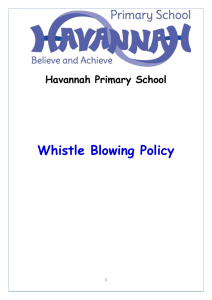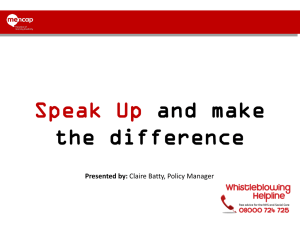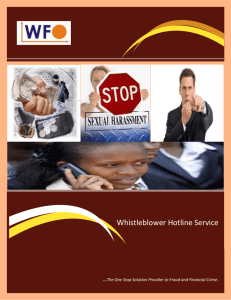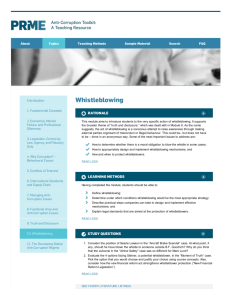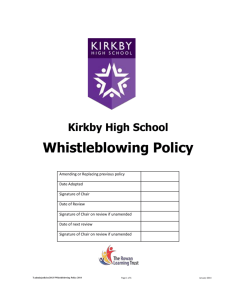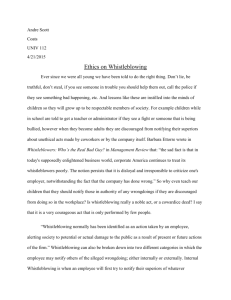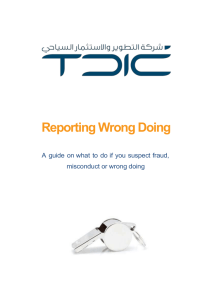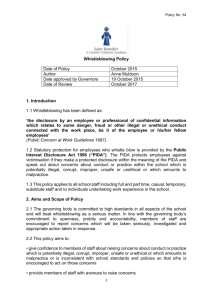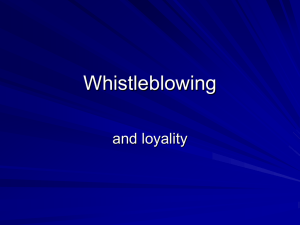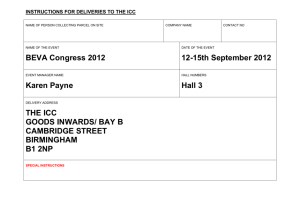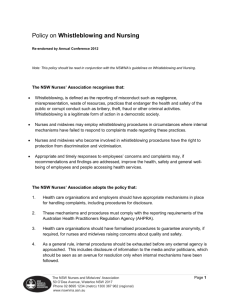ICC Guidelines on Whistleblowing
advertisement
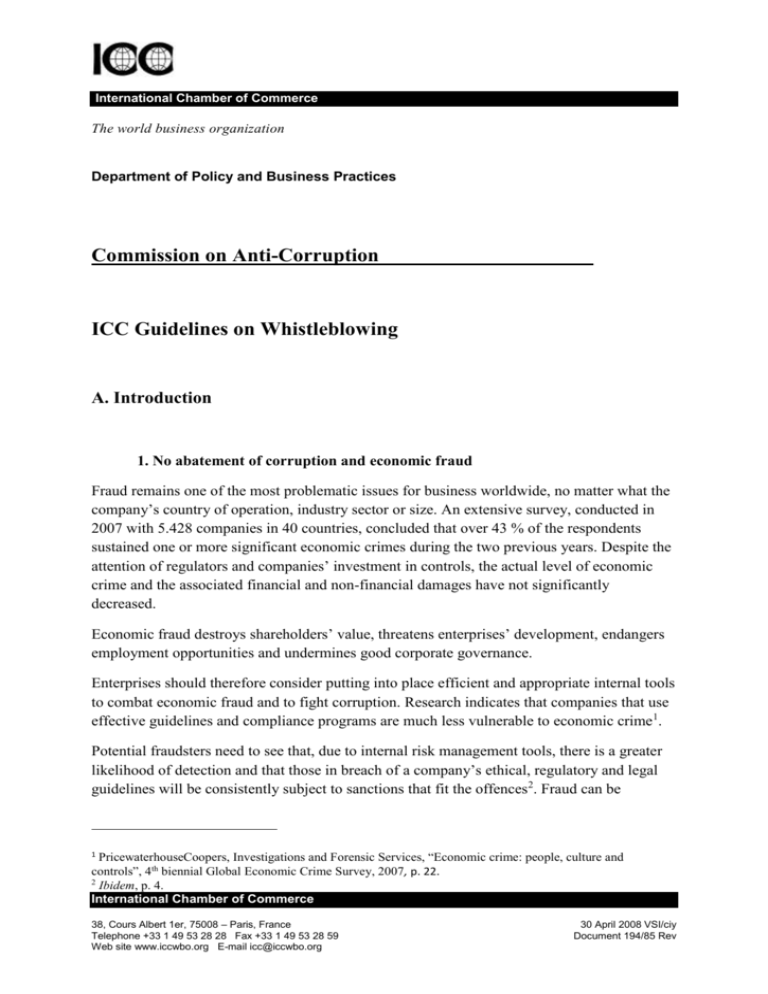
International Chamber of Commerce The world business organization Department of Policy and Business Practices Commission on Anti-Corruption ICC Guidelines on Whistleblowing A. Introduction 1. No abatement of corruption and economic fraud Fraud remains one of the most problematic issues for business worldwide, no matter what the company’s country of operation, industry sector or size. An extensive survey, conducted in 2007 with 5.428 companies in 40 countries, concluded that over 43 % of the respondents sustained one or more significant economic crimes during the two previous years. Despite the attention of regulators and companies’ investment in controls, the actual level of economic crime and the associated financial and non-financial damages have not significantly decreased. Economic fraud destroys shareholders’ value, threatens enterprises’ development, endangers employment opportunities and undermines good corporate governance. Enterprises should therefore consider putting into place efficient and appropriate internal tools to combat economic fraud and to fight corruption. Research indicates that companies that use effective guidelines and compliance programs are much less vulnerable to economic crime1. Potential fraudsters need to see that, due to internal risk management tools, there is a greater likelihood of detection and that those in breach of a company’s ethical, regulatory and legal guidelines will be consistently subject to sanctions that fit the offences2. Fraud can be PricewaterhouseCoopers, Investigations and Forensic Services, “Economic crime: people, culture and controls”, 4th biennial Global Economic Crime Survey, 2007, p. 22. 2 Ibidem, p. 4. International Chamber of Commerce 1 38, Cours Albert 1er, 75008 – Paris, France Telephone +33 1 49 53 28 28 Fax +33 1 49 53 28 59 Web site www.iccwbo.org E-mail icc@iccwbo.org 30 April 2008 VSI/ciy Document 194/85 Rev detected by internal audit, external audit, risk management, corporate security but also, and to a large extent, by whistleblowing. A company’s workforce represents a valuable source of information that can be utilized to identify a potential problem, and to deal with it, before it causes significant damage to the company’s reputation or its stakeholders3. 2. Whistleblowing, an efficient fraud detection tool Recent international professional research shows that whistleblowing, in addition to other instruments, such as people management and internal and external controls, provide the major source for detection of fraudulent behavior in enterprises. A study performed by an international accounting firm4 reveals that not less than 25 % of the occurrences of fraud discovered in the enterprises surveyed came to light thanks to a whistleblowing system put into place by these companies. There is however still some reluctance in parts of the business world to resort to internal fraud reporting by the company’s employees, as it appears from another professional survey covering 13 European countries5 that only 33 % of the respondents state that their company has a hot-line. Cultural differences, legal requirements and psychological obstacles still make the introduction of whistleblowing problematic in certain jurisdictions. 3. The ICC Rules of Conduct and Recommendations Convinced that self regulation provides effective protection of corporate interests, ICC has developed over the years rules aiming at fighting corruption and other forms of economic fraud. In particular, ICC has encouraged companies to put into place efficient preventive policies which can shield them from the grave consequences economic fraud can entail. The 2005 ICC Rules of Conduct on Combating Extortion and Bribery recommend that anti-corruption policies and codes adopted by enterprises should “offer confidential channels to raise concerns, seek advice or report violations without fear of retaliation6.” This ICC Recommendation is extensively commented in Chapter Ten of the ICC Corporate Practices Manual “Fighting Corruption”, written by Mr. Michael N. Davies, Q.C. Institute of Chartered Accountants in England and Wales, “Guidance for audit committees”, March 2004. KPMG Forensic, “Profile of a Fraudster”, Survey, 2007, p. 26. 5 Ernst & Young, “A Survey into Fraud Risk Mitigation in 13 European Countries”. 6 ICC Commission on Anti-Corruption, “Combating Extortion and Bribery: ICC Rules of Conduct and Recommendations, 2005 edition, article 7. 3 4 2 ICC France has taken the initiative to issue guidelines on the important question of putting into place whistleblowing mechanisms in enterprises. 4. Purpose of the ICC Guidelines on Whistleblowing The purpose of these Guidelines is to help companies establish and implement internal whistleblowing programs, by setting forth practical indications, that can serve as a useful point of reference, while meeting, as much as possible, the objections formulated in certain countries about some aspects of a whistleblowing system. These Guidelines are based on the broad experience and practice of ICC member companies across a wide range of sectors and jurisdictions. They are also inspired by a large number of international and national legal provisions. 5. National and international sources of law on whistleblowing Legal provisions covering whistleblowing, either internal or external, are listed below, as they serve as valuable indications for the organizing of reporting within companies: a. International conventions The Inter-American Convention against Corruption (article III, section 8), of March 29, 1996, requires Parties to consider adopting systems for protecting public servants and private citizens who, in good faith, report acts of corruption, including protection of their identities. The United Nations Convention against Corruption, of December 9, 2003 (article 33) requires each State Party to consider incorporating into its domestic legal system appropriate measures to provide protection against any unjustified treatment for any person who reports in good faith and on reasonable grounds to the competent authorities any facts concerning offences established in accordance with [the] Convention. The European Council Criminal Law Convention, of January27, 1999 (article 22) requires each Party to adopt such measures as may be necessary to provide effective and appropriate protection for those who report the criminal offences established in accordance with [the relevant provisions of the Convention]. The European Council Civil Law Convention, of November 4, 1999 (article 9) requires that each Party provides in its internal law for appropriate protection against any unjustified sanction for employees who have reasonable grounds to suspect corruption and who report in good faith their suspicion to responsible persons or authorities. 3 The African Union on Preventing and Combating Corruption, of July 11, 2003 (article 5) requires State Parties to adopt measures that ensure citizens report instances of corruption without fear of consequent retaliation. b. Selected national legislation 1. United Kingdom: Public Interest Disclosure Act 1998 (PIDA) grants whistleblower protection to individuals who make certain disclosures in good faith and in the public interest and allows these individuals to bring action in respect of victimization. 2. United States: Sarbanes-Oxley Act of 2002 (section 806) grants whistleblower protection for employees of publicly traded companies against retaliation in fraud cases. The New York Stock Exchange (NYSE) Listing Manual (Section 303A.10)7 provides that listed companies must adopt a code of ethics for directors, officers and employees. In the commentary, it is stressed that each code of ethics must contain compliance standards and procedures that will facilitate the effective operation of the code and inter alia whistleblowing procedures and whistleblower protection. 3. France: Act nr. 2007- 1598 of November 13, 2007 (article 9) amends the Labor Code and prohibits any discrimination against a person, who has reported or brought a witness report to an employer or to the authorities about corruption. Any discriminatory act is to be declared null and void. c. Recommendations by international public organizations The OECD Guidelines for Multinational Enterprises of 2000 (chapter II, item 9) recommend that enterprises “refrain from discriminatory or disciplinary action against employees who make bona fide reports to management or, to the competent authorities, on practices that contravene the law, the Guidelines or the enterprise’s policies8.” B. ICC Guidelines on Whistleblowing 7 See also Section 4350 of the NASDAQ Listing Manual. The Commentary on this provision reads as follows: Following from effective self-regulatory practices, as a matter of course, enterprises are expected to promote employee awareness of company policies. Safeguards to protect bona fide “whistleblowing” activities are also recommended, including protection of employees who, in the absence of timely remedial action or in the face of reasonable risk of negative employment action, report practices that contravene the law to the competent authorities. While of particular relevance to anti-bribery and environmental initiatives, such protection is also relevant to other recommendations in the Guidelines. 8 4 1. Enterprises are encouraged to establish, within their organization and as an integral part of their integrity program, a whistleblowing system, commensurate with their size and resources. 2. Such whistleblowing system should aim at (i) receiving and entertaining, in full confidentiality, all reasonable requests for advice and guidance on business conduct matters and ethical concerns raised by the employees of the enterprise and of its subsidiaries or affiliates (the group), but also, to any extent possible, by any of the group’s agents, suppliers and customers; and at (ii) receiving and handling, at the earliest stage possible, by the same categories of persons, all reports made about any occurrence, whether established or soundly suspected, of a breach of applicable laws and regulations, the enterprise’s code of conduct or the ICC Combating Extortion and Bribery Rules of Conduct and Recommendations, which could seriously harm the enterprise or the group, if no remedial action is taken. 3. Enterprises should appoint high level personnel of undisputable repute and extensive work experience to be in charge of the management and administration of their whistleblowing units or ombudsservice. This personnel should be given a large autonomy within the enterprise and report to the highest echelon possible within the group. As part of these arrangements, an enterprise may designate a firm, external to the group, specialized in receiving and handling whistleblowing reports. Such firm should be independent, of undisputable repute and should offer appropriate guarantees of professionalism and secrecy. 4. It is up to each individual enterprise to define the kind of communication channels it wants to use for whistleblowing purposes: oral or written communication, telephone-based communication (toll free call help lines or hot-lines) or computer-based communication (Intranet) or any other tool which it considers adequate. Enterprises should endeavor to use in these communication channels as many of the languages spoken in the different countries of operation as reasonably possible. 5. A whistleblowing system, being part and parcel of the enterprises’ voluntary integrity programs, will only be successful if it is not over-regulated from the outside. Enterprises, however, should be aware that, in certain jurisdictions and cultural environments and because of inter alia data protection and labor law concerns, legal restrictions have been imposed on whistleblowing procedures, which they will have to comply with. 5 6. Each individual enterprise may decide, taking into account the applicable law of every country, in which a whistleblowing system will be put into place: (i) whether reporting under the whistleblowing system will be made compulsory or voluntary, and (ii) whether reporting can be done on an anonymous as well as on a disclosed basis. In deciding to opt for an anonymous whistleblowing system, a company may take into account its cultural environment, as well as issues relating to the protection of privacy and the risk of unfair reporting. If an enterprise considers that reporting is made on a voluntary basis, its employees may opt to report a serious occurrence, as defined under § 2 above, under any other internal or external procedure, which is available. 7. All whistleblowers’ reports should be diligently acknowledged, recorded and screened. A whistleblower, whose report is not considered bona fide, should forthwith be told so and such report should be disregarded. If there is abuse of the process, disciplinary action can be envisaged. All bona fide reports should be investigated by the enterprise’s whistleblowing unit and forwarded, under strict confidentiality rules, to the appropriate person(s) or department(s) in the enterprise or group. As soon as reasonably possible, the main results of the due diligence examination should be appropriately communicated as feedback to the whistleblower. The person, whose behavior has been reported, should also be informed of the main object of the ongoing procedure, allowing thereby this person to present objections. 8. All employees should be in a position to report serious occurrences, as defined above, without fear of retaliation or of discriminatory or disciplinary action. Therefore, the whistleblowers employment, remuneration and career opportunities should be protected by the enterprise during a reasonable period of time. 6 Enterprises should maintain, to the fullest extent possible and at all times, the confidentiality of the data revealed through whistleblowing, and the identity of the whistleblower, subject to overriding legal requirements, and protect such data with the most appropriate means. 9. All employees should be in a position to report serious occurrences, as defined above, without fear of retaliation or of discriminatory or disciplinary action. Therefore, the whistleblower’s employment, remuneration and career opportunities should be protected by the enterprise during a reasonable period of time. **** 7
